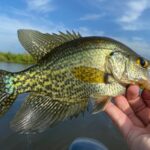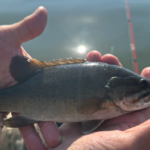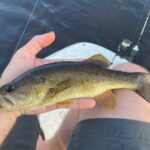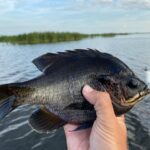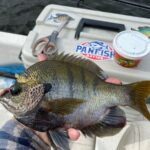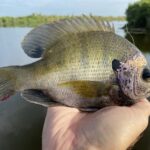For years, old timers and fishing veterans have told tales of ‘hybrid‘ largemouth and smallmouth bass…
But is there any truth to this?
Can largemouth and smallmouth bass breed?
Althrough rare, largemouth and smallmouth bass are capable of breeding. The result is a hybrid offspring, nicknamed the Meanmouth Bass.
With the popularity of bass fishing in North America and around the world…no wonder people are asking this question.
Table of Contents
Can Largemouth And Smallmouth Bass Crossbreed?
Largemouth and smallmouth bass usually live in separate habitats and hardly ever come in contact and do not naturally spawn together.
In fact, when you find them, you are highly encouraged to report them to your state’s Department of Fish and Aquatic Resources or any similar agency so they can be recorded and scientifically studied.
Although largemouth and smallmouth bass have their own preferred habitat characteristics, they can and do meet when they are in the same body of water, coming from different parts. However, this is very rare.
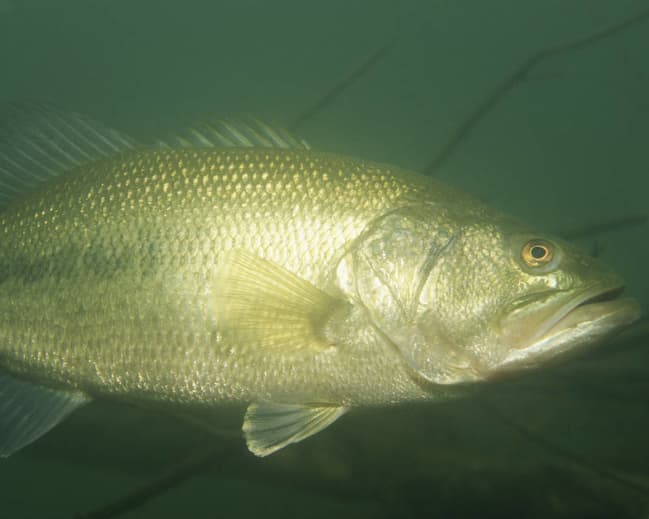
In 1967, Dr. William Childers, published the results of his study on the “Hybridization of Four Species of Sunfishes (Centrarchidae)” (black basses belong to the sunfish family).
Employed by the Illinois Natural History Survey, he and his colleague and graduate student, Paul Beaty, studied hybrids to determine their ultimate value to fisheries managers and sports fishermen.
Childers and Beaty both determined that black bass species failed to hybridize when stocked together in the same ponds, except for largemouth bass and smallmouth bass.
These two produced offspring that grew at a faster rate than either parent species, were deeper-bodied and reproduced at 1 year old when Illinois bass typically reproduced at 2 years old.
The Meanmouth Bass
Childers and Beaty also observed that the hybrid offspring were aggressive in their behavior, “and exhibited little if any, fear of man and other animals”.
As he describes in the report:
“People who swam in ponds which contained hybrids often complained about the hybrids biting them. When the hybrids were small, this behavior was merely annoying, but when they grew to 1-to-2-pound sizes, they occasionally bit a swimmer hard enough to lacerate the skin.”
-Childers and Beaty, Hybridization of Four Species
of Sunfisfies (Centrarchidae)
So, they named the hybrids: “meanmouth bass“.
They also found that under normal fishing conditions, the meanmouth bass was relatively easy to catch, although they put up a spectacular fight, meaner and sportier than the parent smallmouth bass and largemouth bass (sounds awesome!)
It’s already been established that largemouths and smallmouths do not hybridize in their natural environments because of their genetic traits.
Childers and Beaty found, though, that largemouths and smallmouths hybridize with their meanmouth offspring.
Although it is enticing to think of catching more aggressive fish for sport, there are serious implications, like genetic swamping and demographic swamping and their further implications on ecological balance.
Genetic swamping is when the local genotypes are replaced by hybrids, and what this, in turn, can do to fishing practices and the marine environment.
Demographic swamping is when population growth rates are reduced because of outbreeding depression, which is a reduction in the fitness of hybrid offspring…
…In other words, the genetically different offspring push out the native and naturalized species. Yikes.
Can Largemouth and Smallmouth Live Together?
Largemouth and smallmouth bass can live together in larger lakes and rivers, but not in the same parts or habitats.
Generally, smallmouths prefer colder waters and can be found in northern lakes and rivers while largemouths prefer warmer waters and dense vegetative cover.
Both like cover, except that smallmouths don’t enter it while largemouths thrive in it.
So you can find largemouths in brush piles, grasses, and weed beds, and smallmouths around cover like in deep, rocky structures.
Smallmouths thrive in strong currents, while largemouths avoid them. If you’re looking for Smallies in a river, ignore the breaks and cast right into the hard currents.
If you’re looking for Largemouth bass, find a sheltered break, with a thick cover and throw a weedless lure right into the mix.
See Also: 11 Amazing Flies For Smallmouth Bass
It’s also worth noting that when largemouth and smallmouth bass are stocked together in a small pong with limited habitat diversification, the largemouth bass often emerges as the dominant species and eliminate all smallmouth bass within a few years.
Where Are Meanmouth Bass Found?
They can be found in bodies of water with abundant populations of both the largemouth and smallmouth bass. Notable lakes include:
- Table Rock Lake in Missouri
- Lake Ouachita in Arkansas
- O.H. Ivie Lake in Texas
- Veterans Lake in Oklahoma
Georgia and Missouri have also officially reported the presence of meanmouth bass in their waters.
Are Meanmouth Bass Rare?
Meanmouth bass are extremely rare, and only a handful of confirmed catches have been certified over the years.
In January 2022, Brandon Burks caught a 8.52 pound meanmouth in O. H. Ivie Reservoir in Texas.
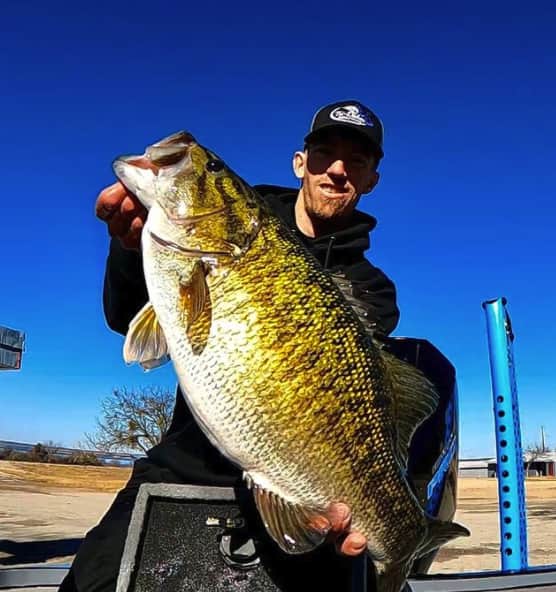
The fish is currently the Texas state record but did not qualify for a world record because it was caught on an Alabama Rig with 5 hooks (The IGFA does not allow more than 3).
How To Identify A Meanmouth Bass
The only way to identify a meanmouth bass with 100% certainty, is by genetic testing from a certified fisheries biologist.
If you think you have caught a meanmouth bass, take photos of the fish from multiple angles. Get length, weight, and girth measurements.
If its legal to possess bass on the body of water you are fishing, you can keep the fish alive in a live well and make a call to your local fisheries office to get more information.
Lots of anglers claim to have caught a meanmouth bass over the years due to unusual patterns, colors or features. But the truth of the matter is that meanmouth bass are very rare, and have only been documented in a handful of lakes in the country.
Conclusion
Bass fishermen are about as dedicated as they come…and whether your chase largemouth bass, smallmouth, or both…you have your work cut out for you if you want to target a meanmouth bass.
Hybridization between two different fish species does occur in the wild (it’s very common with sunfish like bluegill)…and with countless private ponds and lakes throughout the world who knows what else is out there.
The thought of a largemouth and smallmouth bass breeding is cool, and who wouldn’t want to add that to their fishing bucket list?
I know I would!
You May Also Like: Are Largemouth Bass Good To Eat? And Should You Keep Them?
If you haven’t guessed yet, I love fishing and everything about it!
To learn more about why I started Panfish Nation, visit the About page and follow along on Social Media:
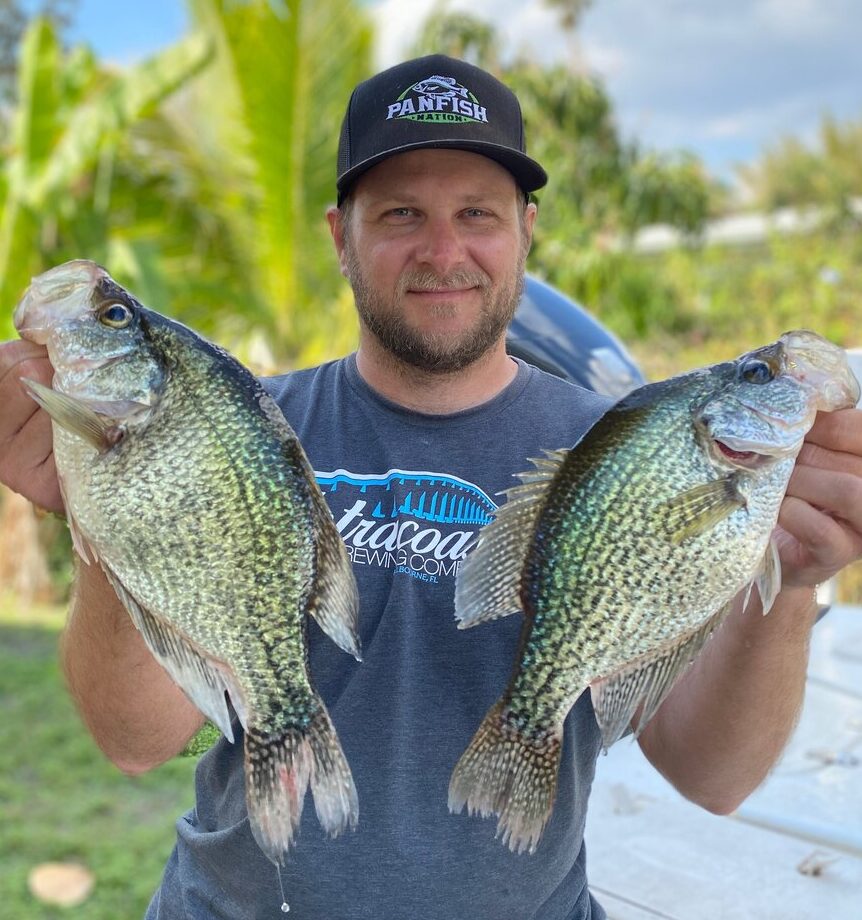

Download a copy of my FREE Lure Color Selection Chart & Knot Guide!
Stay up to date with fishing reports, tackle reviews, industry news, and much more! We respect your privacy, unsubscribe at any time.
Related Content
- Crazy Facts About the World Record Crappie
- What Size Hooks for Smallmouth Bass? Quick Guide
- Large and in Charge-Mouth: 10 of the Best Bass Lures of All Time (And Where to Buy Them)
- Emperor of the Sun(fish): What You Need to Know About the World Record Bluegill
- Coppernose Bluegills: How They’re Different from Common Bluegill
- Bluegill vs Brim: Differences & Terminology, Explained!

